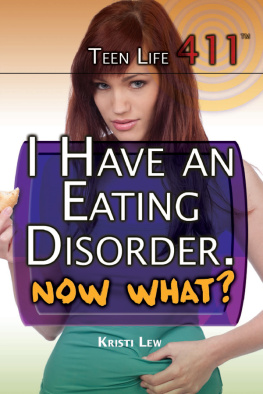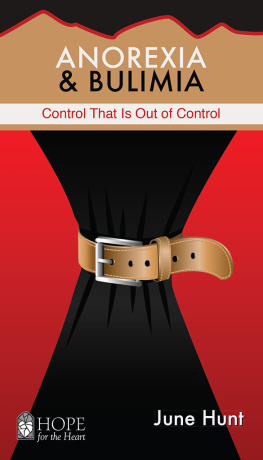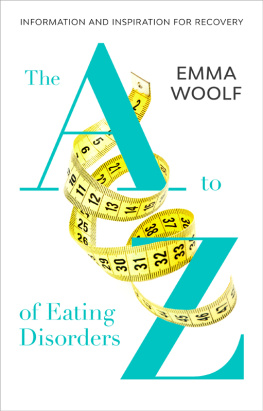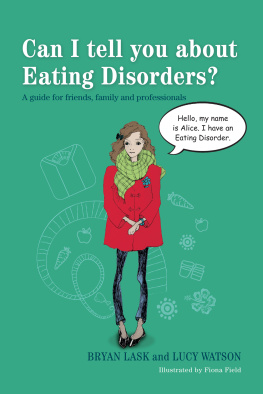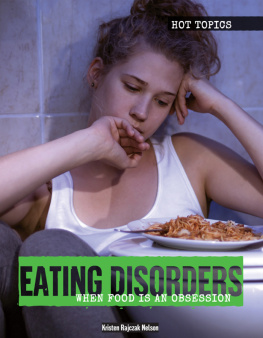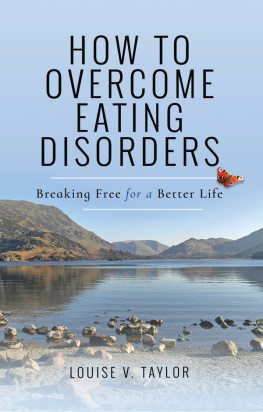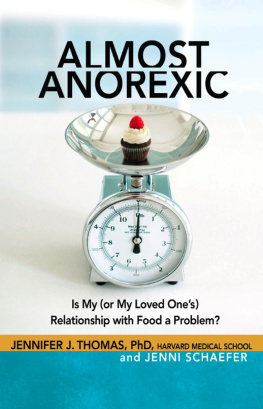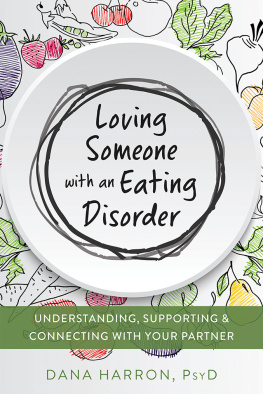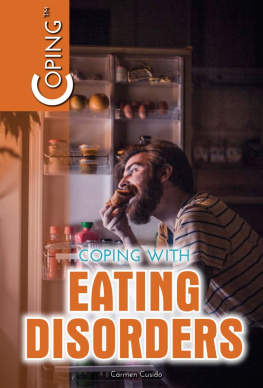Published in 2015 by The Rosen Publishing Group, Inc.
29 East 21st Street, New York, NY 10010
Copyright 2015 by The Rosen Publishing Group, Inc.
First Edition
All rights reserved. No part of this book may be reproduced in any form without permission in writing from the publisher, except by a reviewer.
Library of Congress Cataloging-in-Publication Data
Lew, Kristi, author.
I have an eating disorder. Now what?/Kristi Lew. First edition.
pages cm.(Teen life 411)
Includes bibliographical references and index.
ISBN 978-1-4777-7972-9 (library bound)
1. Eating disorders in adolescenceJuvenile literature.
2. Eating disordersCausesJuvenile literature. 3. Eating disordersTreatmentJuvenile literature. I. Title. II. Series:
Teen life 411.
RC552.E18L52 2015
616.8526dc23
2014007762
Introduction
T hink about the last meal you ate. How do these thoughts make you feel? If the thought of eating makes you anxious, ashamed, or frightened, you may have an eating disorder.
People with eating disorders are controlled by their obsessive thoughts about food and weight, often to the exclusion of everything else. If they dont receive professional help, this intense focus on food can have a devastating effect on their physical and psychological health, their personal relationships, and their academic performance.
According to the National Eating Disorders Association (NEDA), approximately twenty million American women and ten million American men have struggled with an eating disorder. These numbers may be underestimated, however, because not everyone who has an eating disorder seeks treatment.
Adolescents appear to be more at risk for developing an eating disorder than the general population. Statistics gathered by the National Association of Anorexia Nervosa and Associated Disorders (ANAD) indicates that 95 percent of people with eating disorders are between the ages of twelve and twenty-five. In fact, eating disorders are now the third most commonly diagnosed chronic illness in adolescent girls (with asthma and obesity being numbers one and two, respectively).
Because of the ways in which eating disorders are often portrayed in the media, many people may be under the false impression that eating disorders affect only wealthy, teenaged, white females. In reality, at least 5 to 15 percent of the people suffering from eating disorders are male, and the illness can affect people of any age, race, gender, or socioeconomic class.

Constant worry about weight gain or weight loss may be a symptom of a developing eating disorder. With professional help, people who suffer from eating disorders can develop a healthy relationship with food and weight.
Having an eating disorder is not a weakness. Nor are eating disorders diets, lifestyle choices, fads, or phases. People who slightly restrict their calorie intake in order to lose a few pounds probably do not have an eating disorder. Nor do people who occasionally give into the desire to eat too much of their favorite food. Picky eaters and those who have a sweet tooth generally do not have eating disorders either. People who suffer from an eating disorder feel an overwhelming, uncontrollable compulsion to continue a disordered pattern of eating, even when they realize that the behavior is unhealthy and self-destructive.
Although eating disorders are characterized by obsessive thoughts about food and weight, these disorders are not really about either of these things. Instead, the misuse and abuse of food are generally symptoms of underlying emotional issues. These issues may include self-hatred, depression, or feeling lost, alone, or out of control. Sufferers often feel powerless in the face of these uncomfortable emotions and get trapped into unhealthy eating habits in an attempt to cope with their emotional pain. Unfortunately, instead of alleviating the pain, the eating disorder only worsens it.
An eating disorder can lead to feelings of shame, despair, and loneliness. It can divert time and energy away from friends, family, and activities that were once enjoyed. An eating disorder also puts the victims physical and mental health at risk. Sufferers may experience overwhelming feelings of anxiety and fear, even as they are recovering. They may fear that they are harming their bodies. Most of all, they fear that they will never be able to change their eating habits.
If you have an eating disorder, there are a few things you should know: You do not need to face these fears alone. Eating disorders are treatable and recovery is possible. With help, you can learn to have a healthy relationship with food and your body.
chapter 1
What Is an Eating Disorder?
W hile all eating disorders are characterized by an unhealthy relationship with food and weight, doctors and psychologists have identified several different types. Each type of eating disorder manifests itself in a different way, although some symptoms may overlap. People who have struggled with one type of eating disorder are often susceptible to developing a different one at a later date.
Anorexia Nervosa
Anorexia is a Greek word that means loss of appetite. Nervosa comes from Latin and means for nervous reasons. Anorexia nervosa is an eating disorder that is characterized by self-starvation and extreme weight loss.
Despite its name, people suffering from anorexia nervosa do not really lose their appetite. Instead, they are so terrified of gaining weight that they learn to ignore the signs and symptoms of hunger and refuse to eat. Eventually, they become so malnourished and lose so much weight that they suffer a variety of health problems, which may include death.

Research indicates that adolescents, especially adolescent girls, have a higher risk of developing an eating disorder than adults.
Although anorexia can strike at any age, difficulty with the disorder often begins in puberty when the body naturally begins to fill out. Even though this is a natural process that happens to every adolescent, people who develop anorexia perceive this weight gain as alarming. The development of anorexia may also occur in response to a physical attack or psychological bullying. People who suffer from the disorder may feel that school or personal relationships have become overwhelming.
Outwardly, people with anorexia tend to be good students, well behaved, and eager to please. They are often perfectionists. Inwardly, however, they may experience feelings of anxiousness, loneliness, depression, or insecurity.
Anorexia often begins with something as simple as going on a diet to lose a few extra pounds. However, for people who develop anorexia, this diet gradually gets more and more restrictive as time goes on. Eventually, they develop a habit of obsessively counting every calorie in the foods that they consume and repeatedly weighing themselves to make sure they have not gained any weight. When other people notice and admire their weight loss, they may feel vindicated and validated to continue their self-destructive habits.
People with anorexia often develop rules about what, when, where, and with whom they will eat. If you find yourself applying strict rules and rituals to mealtimes and certain foods, you may be in danger of developing anorexia.

